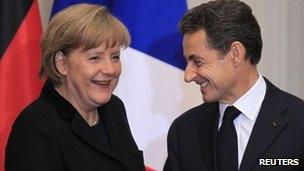New EU treaty debate may permeate into the politics of Northern Ireland
- Published
- comments

Mr Sarkozy said things in Europe could not continue as they were
So are you a unionist or a nationalist?
I'm not talking about all that British and Irish stuff we spend every waking hour talking about.
Instead I want to know whether you are a European Unionist or a British, Irish or indeed other kind of nationalist.
With the German Chancellor Angela Merkel and the French President Nicholas Sarkozy reaching agreement on the need for a new EU treaty, this debate may begin to permeate even the politics of Northern Ireland.
Europe has been a key element in the politics of Ireland for many decades, even though the USA has generally stolen most of the headlines.
It has funded major projects like the £14m Derry Peace Bridge and countless reconciliation initiatives.
European money was crucial to improving Ireland's motorways, dramatically reducing the drive-time between Belfast and Dublin.
European support will be vital if a conflict transformation centre is to be built on the site of the old Maze jail.
Europe has not been just a cash cow, but an important source for political thinking.
The Republic of Ireland joined the European Economic Community in 1973, the same year as Britain.
However Dublin's consistent commitment to Brussels throughout the 70s and 80s reflected a desire to carve out a European identity distinct from its past as a part of the British realm.
Famously John Hume drew inspiration from a walk across the bridge which links France and Germany at Strasbourg.
If the old enemies could end their conflict, he reasoned, then why not the warring camps in Northern Ireland? With that, the seeds for the peace process were sown.
Now the argument over Europe appears primarily economic.
But the out-workings of any treaty change are bound to be politically controversial.
We do not yet know exactly what Angela Merkel means by "fiscal union" but we had a dress rehearsal when a Bundestag committee learned details of a rise in Irish VAT weeks before the Irish Dail.
The indications are that any new treaty would commit eurozone members to balancing all future budgets.
The European Court of Justice could be given the power to rule on whether states had stuck to the rule, but not be able to reject national budgets.
If European technocrats do have more of a role in micro-managing eurozone member states' budgets there would inevitably be pressure for the citizens at the sharp end to have some means of holding the decision makers to account.
Could national parliaments do it, or should the European parliament be given extra teeth?
If the European parliament becomes more influential, should MEPs from eurozone countries have different rights from those representing nations outside the euro?
Could we have a euro equivalent of the West Lothian question - the old chestnut about Scottish MPs getting to vote on English affairs?
If, on the other hand, the European parliament remains unreformed how truly democratic will the EU be?
On the BBC's Inside Politics over the weekend, Brussels-based analyst Nicholas Whyte thought that, even in a future more tightly controlled Euro zone, Dublin will still fight fiercely to retain its low corporation tax rate, although this may mean making budgetary sacrifices elsewhere.
If the Irish government does not win that battle, the long-standing debate about whether Northern Ireland should adopt a matching lower rate could become an irrelevant side-show.
With no SDLP MEP any more to fill John Hume's shoes, all three of Northern Ireland's representatives are sceptical to a differing degree, each concerned about the loss of either British or Irish sovereignty.
Indeed a nationalist MP born on Belfast's Falls Road argued on Monday that any debate on a new EU treaty should be viewed as an opportunity to claw back powers from Brussels.
Paul Maskey? Gerry Adams? No, I'm talking about Conservative Euro sceptic ( and presumably British nationalist) Conor Burns, born in the Royal Victoria Hospital but now representing Bournemouth.
Now an aide to Owen Paterson, Mr Burns told the BBC's World at One that "we should use the opportunity of this treaty change to say to our European partners, 'If you want to go down the route you are going down, please carry on. But this is the opportunity, finally, to get the British dog out of the federalist manger'."
Dogs and mangers? Not the kind of inspirational vision John Hume would have recognised.
But then local politicians, whether they are Euro sceptic or Euro friendly, are not likely to have much impact either way on the future shape of the EU, even though all of our lives will be altered by the course of this debate.